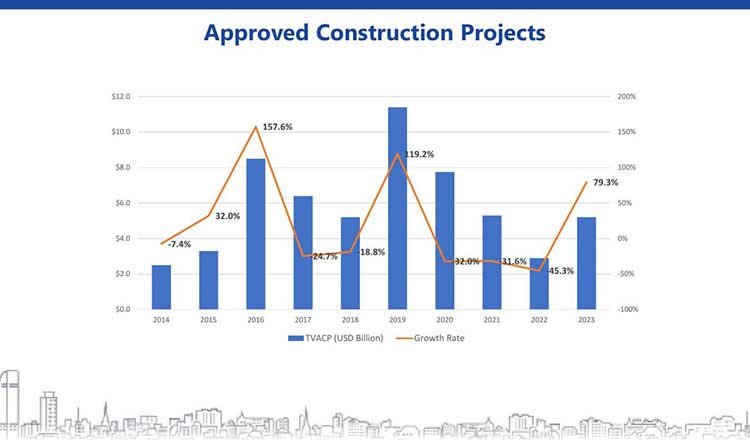Cambodia’s construction sector is growing fast, but navigating the country’s regulatory landscape can be complex. In this article, we will break down the essential elements of Cambodian construction regulations, focusing on the permitting process, zoning laws, and compliance requirements. By understanding these regulations, project planners can better anticipate the challenges and costs involved, ensuring smoother project execution. Keep reading to find out!
Understanding Cambodian Construction Regulations
Cambodia’s construction industry has experienced significant growth, contributing greatly to the economy. In 2020, the value of approved construction projects was $11.4 billion, marking a 19% growth in the sector.
Despite this expansion, the industry is governed by regulations that can be difficult to navigate. Cambodian Construction Regulations are designed to maintain safety, ensure proper urban planning, and control environmental impact. However, the complexity of these regulations has been a challenge for many developers.
Construction Permit Process

The construction permit process in Cambodia is known to be lengthy and complicated. The World Bank ranks Cambodia 180th out of 190 countries in terms of ease of obtaining construction permits. On average, obtaining a permit involves 21 steps and can take up to 652 days. This prolonged process creates delays in project timelines, often leading to increased costs for developers.
Corruption also plays a significant role in the permitting process. According to a Transparency International report, 56% of construction companies in Cambodia have had to pay unofficial fees to speed up the approval of their permits. This makes the process not only lengthy but also costly, further adding to the burden on developers, particularly smaller companies.
Urbanization and Zoning Laws
Cambodia’s rapid urbanization is putting increasing pressure on construction regulations, especially zoning laws. Currently, around 23% of the population lives in urban areas, and this number is expected to rise to 36% by 2030. To manage this growth, zoning laws have become stricter. Zoning laws define how land can be used and ensure that construction projects fit within designated areas. These regulations help prevent informal construction and ensure that housing and commercial projects are developed safely and sustainably.
However, with the fast pace of urbanization, compliance with zoning laws has become a challenge. Project planners must carefully review zoning regulations before starting any project to avoid costly delays and potential legal issues. Failing to adhere to zoning rules can lead to fines or the halting of a project altogether.
Effects of Cambodian Construction Regulations on Project Planning
Compliance Costs
Regulatory compliance in Cambodia’s construction industry can significantly impact a project’s budget. According to a study by the Asia Foundation, compliance with construction regulations can account for 5-7% of a project’s total expenditure. For smaller developers, these costs can be particularly burdensome, as they may not have the resources to navigate the complexities of the regulatory system efficiently.
Safety and Environmental Standards
While there are Cambodian Construction Regulations that address safety and environmental concerns in construction, enforcement remains weak. A report from the Asian Development Bank (ADB) revealed that 75% of construction projects in Cambodia fail to meet international environmental and safety standards. This is especially true for smaller developments and rural projects, where oversight is less stringent. Failing to comply with these standards can result in project shutdowns, legal issues, and even accidents, which can cause significant financial losses for developers.
In conclusion, understanding and complying with Cambodian Construction Regulations is essential for successful project planning. Developers need to be aware of the lengthy and complex permit approval process, the impact of urbanization on zoning laws, and the costs associated with regulatory compliance. Corruption and weak enforcement of safety and environmental standards further complicate the regulatory landscape. Familiarizing themselves with these challenges and planning accordingly will help developers mitigate risks, avoid costly delays, and ensure the success of their projects.
